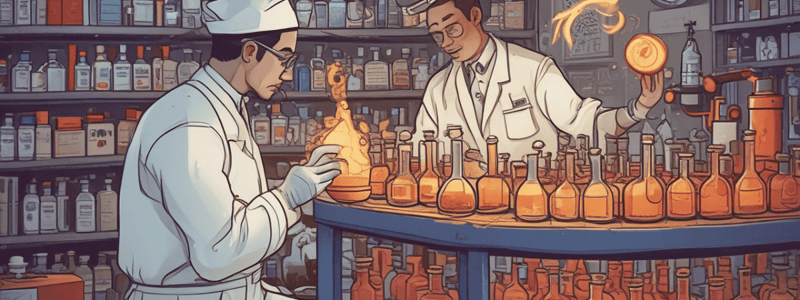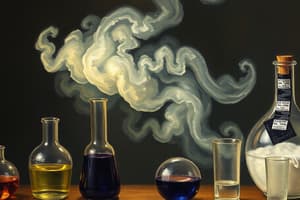Podcast
Questions and Answers
What is the primary purpose of wearing safety goggles in the laboratory?
What is the primary purpose of wearing safety goggles in the laboratory?
To protect eyes from chemicals and other hazardous materials
Why is eating and drinking prohibited in the laboratory?
Why is eating and drinking prohibited in the laboratory?
Food may pick up toxic chemicals
What should you do if you need to smell a chemical's odor?
What should you do if you need to smell a chemical's odor?
Waft the odor towards your nose with your hand
Why is it essential to label all containers in the laboratory?
Why is it essential to label all containers in the laboratory?
What should you do if you spill a chemical on your skin?
What should you do if you spill a chemical on your skin?
Why is it important to use clean, dry spatulas when removing chemicals from bottles?
Why is it important to use clean, dry spatulas when removing chemicals from bottles?
What should you do with excess chemicals after an experiment?
What should you do with excess chemicals after an experiment?
Why is it important to avoid touching hot objects in the laboratory?
Why is it important to avoid touching hot objects in the laboratory?
What should you wear to lab to ensure your safety?
What should you wear to lab to ensure your safety?
Why is it important to read the entire experiment before coming to lab?
Why is it important to read the entire experiment before coming to lab?
What should you do if you arrive late to lab and miss a substantial portion of the introductory discussion?
What should you do if you arrive late to lab and miss a substantial portion of the introductory discussion?
Why is it important to keep your benchtop uncluttered?
Why is it important to keep your benchtop uncluttered?
Where should you place your personal items during lab?
Where should you place your personal items during lab?
What should you do with waste chemicals?
What should you do with waste chemicals?
Why is it important to notify your instructor immediately of all accidents?
Why is it important to notify your instructor immediately of all accidents?
What should you learn to locate and operate in the lab?
What should you learn to locate and operate in the lab?
Under what circumstances are drawers and cabinets allowed to be open in the lab?
Under what circumstances are drawers and cabinets allowed to be open in the lab?
What should you consider when planning a short break during the experiment?
What should you consider when planning a short break during the experiment?
What is the consequence if a student is deemed to be a safety hazard to themselves or others due to the influence of drugs or other factors?
What is the consequence if a student is deemed to be a safety hazard to themselves or others due to the influence of drugs or other factors?
What are the three tasks that should be completed at the end of every lab session?
What are the three tasks that should be completed at the end of every lab session?
Why is it important to turn off electrical devices and water at the end of the lab session?
Why is it important to turn off electrical devices and water at the end of the lab session?
What is the primary reason for informing a neighbor and the instructor when taking a short break during the experiment?
What is the primary reason for informing a neighbor and the instructor when taking a short break during the experiment?
Flashcards are hidden until you start studying
Study Notes
Laboratory Safety Rules
- Safety goggles must be worn in the lab at all times to protect eyes from chemicals and other hazards.
- Eating and drinking are prohibited in the lab to prevent ingesting toxic chemicals.
- Inhaling fumes or vapors is not allowed, and fume hoods must be used for dangerous or irritating chemicals.
- Chemicals should never be tasted, as they can be corrosive and poisonous even in small quantities.
- Unauthorized experiments are not permitted, and students must work under instructor supervision to avoid accidents.
- Nothing, including chemicals and glassware, can be removed from the lab as it is illegal.
- Containers must be labeled to identify their contents.
- Reagent bottles should not be contaminated by putting anything back into them, and only clean, dry spatulas should be used to remove chemicals.
- Excess chemicals must be properly disposed of to prevent hazards.
- Chemicals should be left in their proper place and not carried to the benchtop in original containers.
- Hot objects should be handled carefully, and beaker tongs should be used to remove hot containers from the hot plate.
- Skin spills should be rinsed immediately with large amounts of water to prevent harm.
- Broken glassware should be cleaned up immediately and disposed of in the labeled crock at the front of the lab.
- Accidents, including spills and injuries, must be reported to the instructor immediately.
- Students should know the location and operation of safety equipment, including the safety shower, fire extinguisher, eye-wash fountain, fire blanket, and fire exit.
Laboratory Procedures
- Students must dress properly for lab, wearing clothing that covers as much skin as possible, and confine loose clothing and long hair.
- Students should read the entire experiment before coming to lab and arrive on time to avoid missing important safety discussions and instructions.
- Working independently is expected unless otherwise instructed, and students should keep their benchtop uncluttered.
- Drawers and cabinets should be kept closed except when taking or returning items to maintain a safe and organized work environment.
- Planned breaks should be taken during less critical times in the experiment, and students should inform their neighbors and instructor.
- Students should not come to lab under the influence of drugs or medication that may affect their judgment or ability to work safely.
- Students must clean up at the end of each lab session, returning clean glassware to their drawer, cleaning their benchtop, and washing their hands thoroughly.
Studying That Suits You
Use AI to generate personalized quizzes and flashcards to suit your learning preferences.




